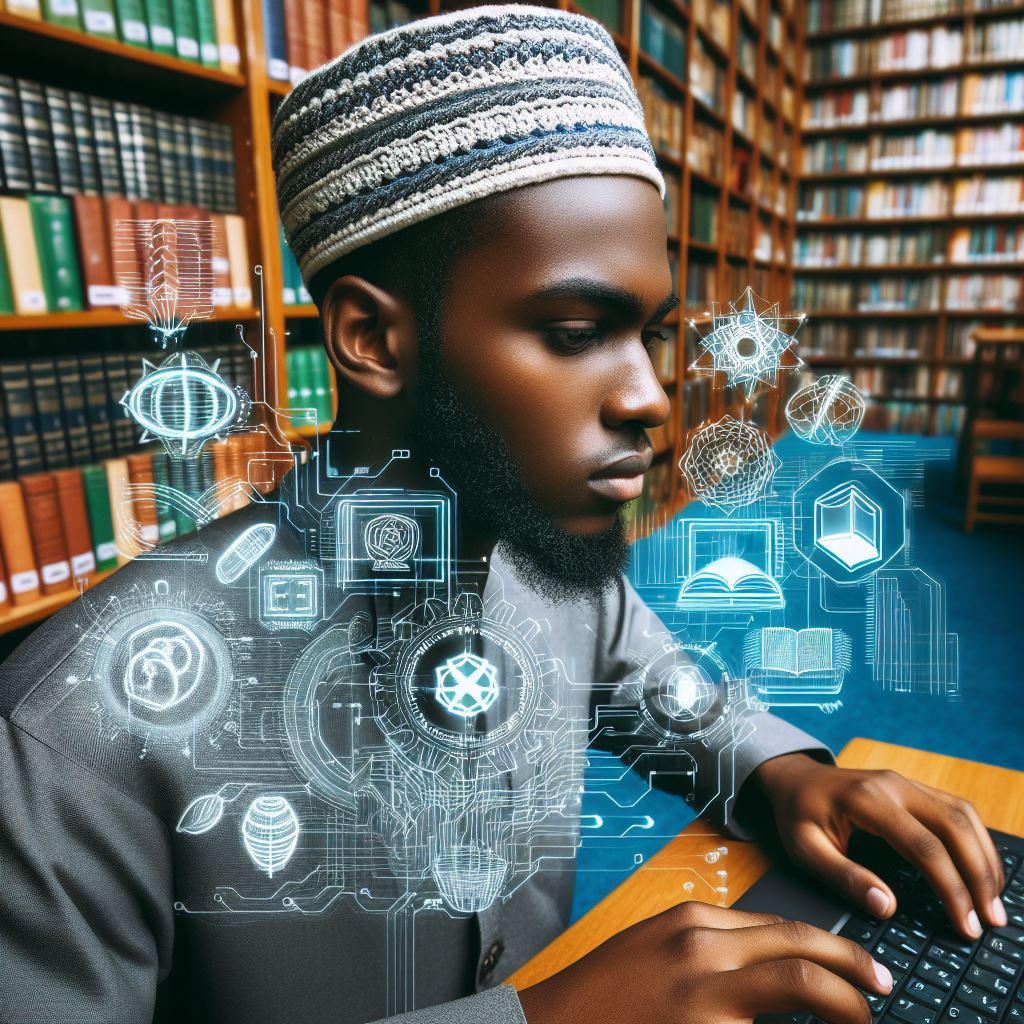Introduction
Brief Overview of Arabic Studies in Nigeria
Arabic studies in Nigeria have a rich history. Traditional methods focus on classical texts and religious teachings. Modern approaches incorporate contemporary issues and technology. Both methods aim to preserve and expand Arabic knowledge.
Importance of Arabic Studies in Nigerian Society
Arabic studies play a crucial role in Nigerian society. They foster cultural and religious understanding.
Promote Literacy
Arabic literacy helps in understanding Islamic texts.
It enhances religious education and practice.
Cultural Preservation
Arabic studies preserve historical and cultural heritage.
They maintain linguistic diversity in Nigeria.
Economic Opportunities
Knowledge of Arabic opens up job opportunities.
It enables engagement in international trade and diplomacy.
Arabic studies in Nigeria are essential for educational, cultural, and economic growth. Both traditional and modern approaches contribute significantly to this field.
Traditional Arabic Studies in Nigeria
History and Origins of Traditional Arabic Studies in Nigeria
Arabic studies in Nigeria have a long history, dating back to the establishment of Islamic schools in ancient times.
These schools were primarily located in northern Nigeria, where Islam had a stronghold.
Arabic was introduced as a language of instruction in these schools, along with teachings on Islamic principles and values.
Over the years, Arabic studies became intertwined with religious education, shaping the cultural and educational landscape of the region.
Curriculum and Teaching Methods in Traditional Arabic Schools
The curriculum in traditional Arabic schools focuses on teaching Arabic language, Quranic studies, and Islamic jurisprudence.
Students start with learning the Arabic alphabet, grammar, and vocabulary, gradually progressing to reading and writing Arabic texts.
Teaching methods include rote memorization, recitation, and practice exercises to enhance understanding and retention.
Islamic scholars, known as Mallams or Ustaz, play a significant role in imparting knowledge and guiding students through their studies.
Role of Islamic Scholars in Teaching Traditional Arabic Studies
Islamic scholars in Nigeria serve as teachers, mentors, and spiritual guides to students in traditional Arabic schools.
They possess in-depth knowledge of Arabic language, Quranic teachings, and Islamic traditions, which they pass on to their students.
These scholars provide individualized attention, ensuring that each student receives personalized guidance and support in their learning.
Their dedication and commitment to preserving and promoting Arabic studies contribute to the rich cultural heritage of Nigeria.
Read: Language Learning in African and Asian Studies
Modern Arabic Studies in Nigeria
The emergence of modern Arabic studies in Nigeria
Modern Arabic studies in Nigeria have emerged as a response to the growing demand for Arabic language proficiency and Islamic education.
These studies have gained popularity due to the desire for individuals to understand the language and culture better.
Many schools and institutions have started offering modern Arabic studies to cater to this demand.
The curriculum and teaching methods used in modern Arabic schools
The curriculum in modern Arabic schools typically includes language courses, Islamic studies, and cultural immersion activities.
Students are taught Arabic grammar, vocabulary, and reading skills to help them become proficient in the language.
In addition to language courses, students also learn about Islamic history, theology, and practices.
Teaching methods in modern Arabic schools often involve a combination of traditional lectures, interactive activities, and multimedia resources.
The integration of technology in modern Arabic studies
Modern Arabic studies in Nigeria have started integrating technology into their curriculum to enhance learning outcomes.
Students now have access to online resources, educational apps, and multimedia materials to supplement their studies.
Technology has also allowed for distance learning opportunities, making Arabic studies more accessible to a wider audience.
Overall, the integration of technology has improved the learning experience and made modern Arabic studies more engaging and interactive.
Read: Global Impact of African and Asian Studies Research
Curriculum Comparison
Traditional Arabic Studies Curriculum
Traditional Arabic studies in Nigeria emphasize classical texts and Islamic scholarship. Students focus on:
- Quranic Studies: Deep memorization and interpretation of the Quran.
- Hadith: Study of the sayings and practices of Prophet Muhammad.
- Fiqh: Islamic jurisprudence and legal theory.
- Tafsir: Quranic exegesis and commentary.
- Arabic Grammar and Rhetoric: Mastery of classical Arabic language structures.
The traditional curriculum relies heavily on rote memorization and teacher-led instruction. Students learn in madrasas or Islamic schools, often under strict guidance from scholars.
Modern Arabic Studies Curriculum
Modern Arabic studies incorporate contemporary educational methods and broader subjects. The curriculum includes:
- Modern Standard Arabic (MSA): Emphasis on current language usage.
- Arabic Literature: Study of both classical and contemporary works.
- History and Culture: Exploration of Arabic-speaking regions’ history and cultural heritage.
- Linguistics: Analysis of language structure and use.
- Technology and Media: Integration of digital tools and media resources in language learning.
Modern programs use interactive methods, including group work, multimedia resources, and language labs. Universities and language institutes typically offer these programs.
Relevance of Each Curriculum
Traditional Curriculum
- Religious Foundations: Essential for students pursuing Islamic scholarship or religious leadership roles.
- Cultural Preservation: Maintains the continuity of historical Islamic practices and knowledge.
- Depth of Knowledge: Provides a thorough understanding of classical texts and religious contexts.
Modern Curriculum
- Practical Communication: Prepares students for real-world interactions in Arabic-speaking environments.
- Employment Opportunities: Equips students with language skills needed in diplomacy, business, and academia.
- Adaptability: Allows for integration of contemporary issues and modern perspectives.
Impact on Students’ Proficiency
Traditional Curriculum
- High Proficiency in Classical Arabic: Students achieve strong command over classical texts and religious discourse.
- Limited Modern Usage: Less emphasis on conversational skills and modern language applications.
Modern Curriculum
- Balanced Proficiency: Students develop skills in both written and spoken Arabic, suited for various contexts.
- Broader Applications: Enhanced ability to use Arabic in modern professional and social settings.
Comparing traditional and modern Arabic studies in Nigeria reveals distinct advantages in each approach. Traditional curricula offer deep religious and classical knowledge, crucial for Islamic scholarship.
Modern curricula, on the other hand, provide practical language skills and adaptability, essential for contemporary applications.
Both curricula impact students’ proficiency differently, shaping their capabilities based on the educational focus. Integrating elements from both could offer a comprehensive Arabic education, meeting diverse student needs.
Read: Career Paths in Communication and Language Arts

Explore Further: Popular Mass Communication Alumni in Nigeria
Explore Further: Best Polytechnics for Mass Communication in Nigeria
Teaching Methods
Comparison of Teaching Methods
Traditional Arabic studies in Nigeria typically involve rote learning, memorization of texts, and recitation in an oral form.
Modern Arabic studies, on the other hand, incorporate interactive multimedia tools, online resources, and student-centered approaches.
Effectiveness of Teaching Methods
The traditional method may help in preserving cultural heritage and fostering discipline in students.
However, modern teaching methods are often more engaging, promote critical thinking, and cater to diverse learning styles.
Advantages of Traditional Teaching Methods
- Strong emphasis on memorization helps in preserving Arabic language and Islamic culture.
- Encourages discipline and respect for authority figures in the learning process.
Disadvantages of Traditional Teaching Methods
- Rote learning may limit critical thinking and creativity among students.
- Focus on memorization can lead to superficial understanding and lack of deep comprehension.
Advantages of Modern Teaching Methods
- Incorporation of multimedia tools makes learning more interactive and engaging.
- Promotes critical thinking, creativity, and problem-solving skills among students.
Disadvantages of Modern Teaching Methods
- Over-reliance on technology may hinder traditional skill development in Arabic studies.
- Lack of access to necessary resources or training for effective implementation of modern methods.
Overall, a combination of traditional and modern teaching methods in Arabic studies in Nigeria may be the most effective approach.
It is essential to strike a balance between preserving cultural heritage through traditional methods and embracing innovation to cater to the diverse learning needs of students in the modern era.
Read: Scholarships for Communication Arts Students in Nigeria
See Related Content: Career Paths for Psychology Graduates in Nigeria
See Related Content: Fine vs. Applied Art: Key Differences Explained
You Might Also Like: Government Policies Impacting Nigerian Economics
Transform Your Career with Expert Guidance
Get personalized mentorship consulting that’s tailored to your unique path. Our expert advice is actionable and exclusive.
Get StartedFind Out More: Exploring African and Asian Religions in Studies
Student Engagement
When it comes to student engagement in Arabic studies in Nigeria, there is a significant difference between traditional and modern approaches.
Below, we will analyze the level of student engagement in each, discuss the factors that influence student engagement, and suggest strategies to enhance it.
Analyze the level of student engagement in traditional and modern Arabic studies
- In traditional Arabic studies, student engagement is often passive, with a focus on rote memorization and recitation.
- Students may lack interest in the subject due to the monotonous teaching methods and lack of practical application.
- Conversely, in modern Arabic studies, student engagement is more interactive and technology-driven, allowing for active participation.
- Modern approaches incorporate multimedia resources, online platforms, and collaborative projects to keep students engaged.
The factors that influence student engagement in Arabic studies
- The teaching methodology plays a crucial role in determining student engagement in Arabic studies.
- Instructors who use innovative and interactive teaching methods tend to have more engaged students.
- The relevance of the curriculum to students’ lives and future career prospects can also impact their engagement.
- The learning environment, including classroom dynamics and resources available, can either hinder or enhance student engagement.
Suggest strategies to enhance student engagement in both traditional and modern Arabic studies
- Implement project-based learning activities that promote active participation and practical application of Arabic language skills.
- Encourage student collaboration through group projects, debates, and discussions to foster engagement and critical thinking.
- Incorporate technology tools such as online learning platforms, educational apps, and multimedia resources to make learning more engaging.
- Provide real-world examples and case studies that demonstrate the relevance of Arabic studies to students’ lives and future aspirations.
By addressing these factors and implementing strategies to enhance student engagement, both traditional and modern Arabic studies in Nigeria can become more enriching and impactful for students.
See Related Content: The Role of Directors in Nigerian Film Production
Delve into the Subject: Leading Criminologists in Nigeria
Conclusion
Traditional and modern Arabic studies in Nigeria have been compared in this piece, highlighting their differences and similarities.
The significance of preserving traditional Arabic studies lies in maintaining cultural heritage and historical knowledge.
On the other hand, modern Arabic studies offer a contemporary perspective, integrating technology and new teaching methodologies.
To promote the growth of Arabic studies in Nigeria, it is essential to strike a balance between traditional and modern approaches.
Collaboration between educational institutions, government support, and community involvement are key for the development of Arabic studies.
Encouraging the inclusion of Arabic in national curriculums and offering scholarships for students interested in Arabic studies can also contribute to its growth.
In closing, embracing both traditional and modern Arabic studies in Nigeria can enrich education, preserve cultural heritage, and bridge the gap between the past and the future.




